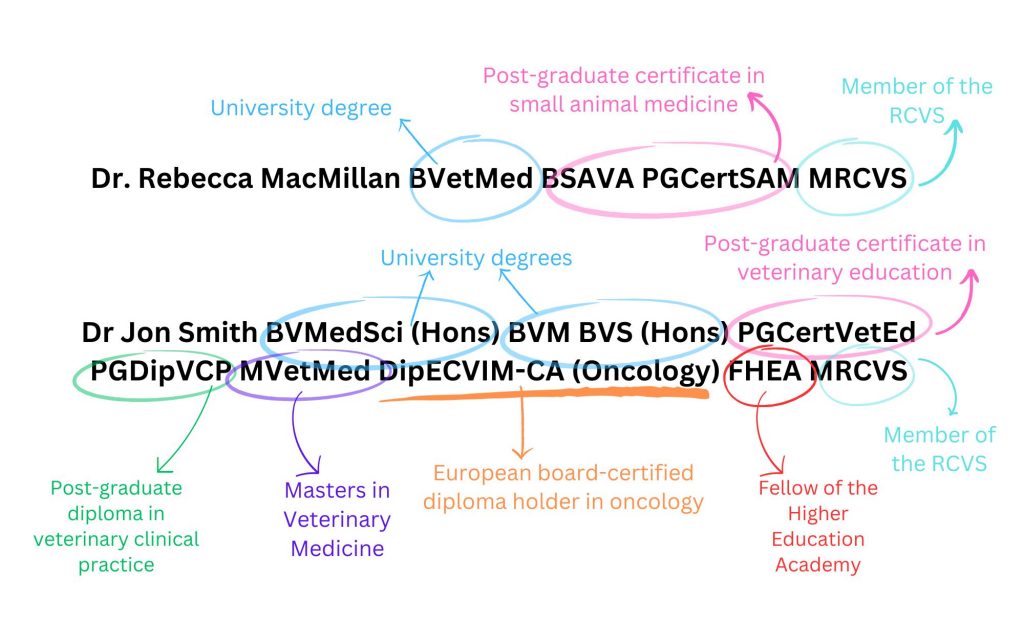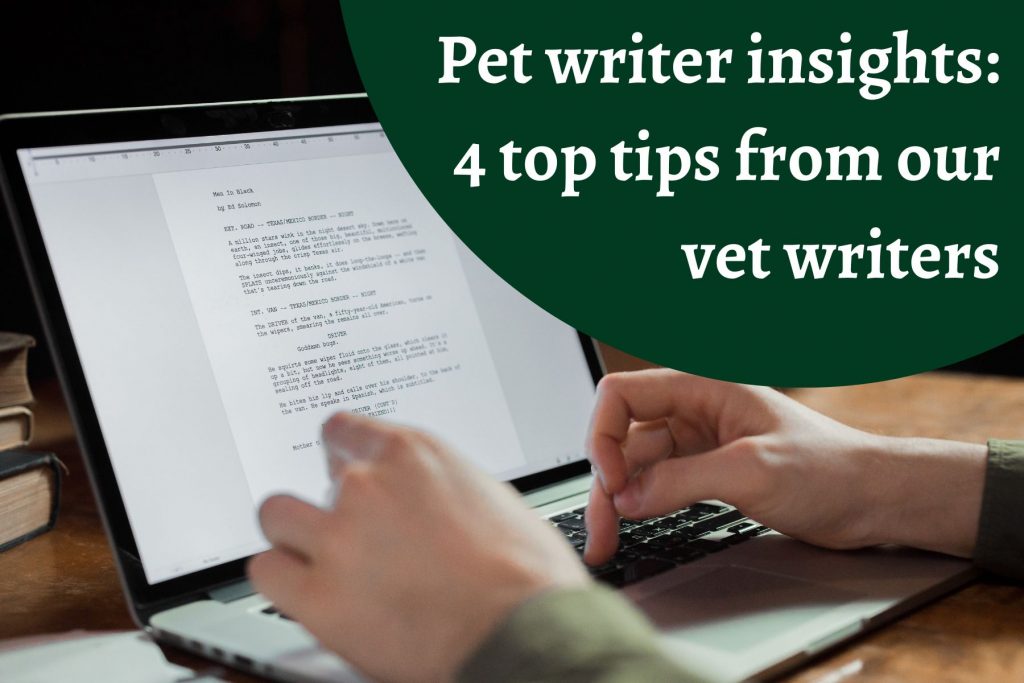When employing a vet to write the content for your website or social media pages, the letters after their name might catch your eye. In some cases, there can be quite an impressive array… but do you know what they actually all mean? And why is it that different vets seem to have different veterinarian credentials? We’ll break it down for you here.
University and Degree
All vets will have at least two sets of letters after their name. The first lot varies depending on which university (vet school) that individual went to. In the UK the universities award the following letters after successful completion of the degree course –
- VetMB – Bachelor of Arts, Bachelor of Veterinary Medicine (awarded by Cambridge University)*
- BVetMed – Bachelor of Veterinary Medicine (awarded by the Royal Veterinary College)
- BVM BVS BVMedSci – Bachelor of Veterinary Medicine, Bachelor of Veterinary Surgery, Bachelor of Veterinary Medical Sciences (awarded by Nottingham University)**
- BVM&S or BVMS – Bachelor of Veterinary Medicine and Surgery (awarded by Edinburgh and Glasgow universities)
- BVMSci – Bachelor of Veterinary Medicine and Science (awarded by Surrey University)
- BVSc – Bachelor of Veterinary Science (awarded by Bristol or Liverpool University)
Although the letters differ, the result is the same. Any vet who has successfully completed their studies at vet school will have a degree. This degree takes at least 5 years to complete in the UK.
*Cambridge also offers graduates the option to convert their degree to an MA VetMB after 3 years.
**Nottingham awards the BVMedSci after 3 years when vet students complete their dissertation. They then go on to complete the BVM BVS at the end of the fifth year.
MRCVS (UK)
The other set of letters that all UK-practising vets have following their name is MRCVS, which stands for Member of the Royal College of Veterinary Surgeons. Veterinary surgeon is a protected title which means that by law, only registered vets can practice acts of veterinary surgery.
To become an MRCVS, vets need to have their degree from an approved university, or complete an exam to show their knowledge is the same as that from an approved university. They then have to ‘swear in’ to the RCVS and pay an annual fee. To maintain their membership, vets with an MRCVS also have to complete their Continuing Professional Development (CPD) requirements, which is 35 hours per year of lectures and research on topics relevant to their position. Vets are not legally allowed to practice in the UK unless they’re an MRCVS, no matter what their degree.
Some vets may have FRCVS instead of MRCVS which denotes them as a Fellow of the Royal Veterinary College of Veterinary Surgeons. This means that as well as being a member of the RCVS they have been recognised with a fellowship for their exceptional contributions towards the veterinary profession, veterinary knowledge, or clinical practice.
DVM (US and some other countries)
In America, vets will instead have the letters DVM (Doctor of Veterinary Medicine) after their name or VMD (Veterinary Medical Doctor – awarded by the University of Pennsylvania) which shows that they have qualified from a veterinary school in the United States.
DVM and MRCVS are equivalent qualifications – MRCVS means the vet is registered to practice in the UK, while DVM means they practice in the US. Other countries have similar requirements, but DVM is a common one!
Postgraduate qualifications
Some vets study for additional qualifications in their chosen area of interest. Vets will work towards these alongside their day job, attending lectures, writing up cases they see in practice and sitting examinations to complete their ‘certificate’. These achievements are recognised by additional letters after the vet’s name and could take a few years to complete. Some of the more common ones that you might see for vets working in general practice include:
- CertAVP (certificate in advanced veterinary practice)
- PgC or PGCert (Postgraduate certificate)
- GPCert (General Practitioner Certificate).
If they have studied a specific area of veterinary medicine (rather than a general one) then this will usually be recognised in the initials as well. This could be related to a certain species and/or subject area. For example – ‘PGCertSAM’ stands for a postgraduate certificate in small animal medicine and ‘CertAVP(Sheep)’ means they have a certificate in sheep health and production.
These qualifications don’t make the vet a specialist in their subject area but demonstrate that they have a keen interest and have carried out further training compared to a standard vet. Most of these certificates are equivalent to a master’s degree (level 7). Some vets with certificates apply to become ‘Advanced Practitioners’ which means demonstrating that they continue to meet certain RCVS criteria including carrying out many hours of ongoing training and continued professional development (CPD) in their subject area. Note that not all certificate holders decide to go on to apply for advanced practitioner status.
Vets who want to become a specialist in their field need to have achieved a post-graduate qualification to diploma level and must make an active contribution in their field (e.g. publishing papers), which is a higher level again than advanced practitioner status. They have to pay extra to maintain their presence on a specialist register.
Board-certified vets and diplomats
As mentioned above, for a vet to be a specialist in a certain field they must have post-graduate qualifications to diploma level. In addition to this, they must undertake intensive training supported by other board-certified diploma holders. This lasts for a minimum of three years. They must also reaccredit their qualification every 5-10 years, by lecturing and researching in their chosen field, as well as attending international meetings with other specialists.
So how can you tell if a vet is board-certified? The letters after their name may vary depending on which institute the vet has been accredited by. For example, the diploma in cardiology may look like DipECVIM-CA if awarded by the European College of Veterinary Internal Medicine, DipACVIM from the American College of Veterinary Internal Medicine, or DVC if through the RCVS.
PhD or MSc
Some vets may have studied towards a master’s (MSc) or a doctorate (PhD) which could be in a veterinary subject or it could be something a little different (e.g. business administration – MBA). If they have successfully completed their studies, they will have these initials after their name also.
Doctor (Dr) title
One thing that can confuse is the doctor (Dr) title which, if used, will appear before a vet’s name. In the UK, the title of doctor is optional for veterinary surgeons. In 2015 vets were allowed to start using this courtesy title without having a PhD (or human medicine qualification), to bring the UK in line with other countries. A vet that does not use this title is no less qualified than a vet that chooses to.

Summary
Any vet that has completed their qualification from vet school and is a Member of the RCVS (MRCVS) will be able to practice veterinary medicine and surgery in the UK, which includes writing about veterinary subjects too. Any additional letters denote an area of interest in a certain field of veterinary medicine. This is nice to have but doesn’t mean that one vet is any better or worse than another.
If you are still uncertain what the letters mean after your vet’s name, then why not ask them? I’m sure they will happily explain what their veterinarian credentials mean – after all, they will have worked very hard and should be proud to talk about their achievements!
Why good pet copywriters can’t be replaced by AI
Ahhhh! AI is coming to steal our jobs! Isn’t it? Well, no. Good pet copywriters…
Pet Marketing Magic: The Role of Pet Professional Copywriting
Digital marketing is crucial to the success of most companies these days. But with so…
Exploring the Pet Industry Writer’s Toolkit
With many careers and jobs, it is hard to fully appreciate what goes on behind…
Pet writer insights: 4 tips from 4 of our pet content writers
The Veterinary Content Company is nearly four years old, but the combined experience of our…
Veterinary copywriter secrets: 9 ways to make pet parents into loyal customers
Pet owners are hungry for knowledge. They want to know more about their pets and…
SEO for the vet industry – what you need to know in 2024
Whether you’re a mobile vet practice, a small branch, or part of a huge corporate…








